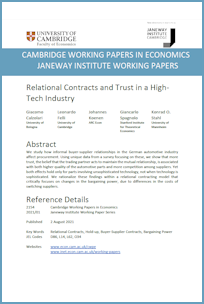
Rauh, C. and Santos, M. R.
How do transfers and universal basic income impact the labor market and inequality?
CWPE2208
Abstract: This paper studies the impact of existing and universal transfer programs on vacancy creation, wages, and welfare using a search-and-matching model with heterogeneous agents and on-the-job human capital accumulation. We calibrate the general equilibrium model to match key moments concerning unemployment, wage and wealth distributions, as well as the distribution of EITC and transfers. In addition, unemployment insurance benefits are related to pre-unemployment earnings and subject to exhaustion, after which agents can only rely on transfers and savings. First, we show that existing transfers hamper economic activity but provide sizeable welfare gains. Next, we show that a universal basic income of nearly $12,500 to each household per year, which replaces all existing transfer programs and unemployment benefits, can lead to small aggregate welfare gains. These welfare gains mostly accrue to less skilled individuals despite their sizable fall in wages, and the overall rise in skill premia and wage inequality. Albeit the extra burden of higher taxes to finance UBI, we show that the increased action in hiring is a key channel though which outcomes for low education groups improve with the reform. However, if we keep the UI benefits in place, the positive effects on job creation vanish and UBI does not improve upon the current system.
Keywords: EITC, General equilibrium, Inequality, Labor supply, Life cycle, Means-tested transfers, On-the-job human capital accumulation, Transfer programs, UBI, Unemployment, Universal basic income, Welfare programs
JEL Codes: C33 O40 O44 O51 Q51 Q54
Author links: Christopher Rauh
PDF: https://www.econ.cam.ac.uk/research-files/repec/cam/pdf/cwpe2208.pdf 
Open Access Link: https://doi.org/10.17863/CAM.81911
